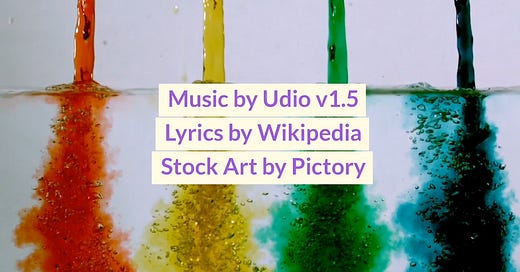https://www.brandonsanderson.com/pages/books-and-art
In which I present the Wikipedia page for Warbreaker in audio, and the stock art fever dream version that “AI” selected for each sentence. The audio and video presentation contain lyrics from the Creative Commons 3.0-licensed Warbreaker text, but those lyrics will not reproduced here since this text post is not fan art, and is thus has no exemption to the no-derivatives rights policy that the audio/video enjoys. For a full explanation, see Warbreaker Rights Explanation.
The text for these verbatim sections may be found at the official source, or navigated to more easily via Coppermind (https://coppermind.net/wiki/Summary:Warbreaker)
https://www.brandonsanderson.com/blogs/blog/warbreaker-prologue
https://www.brandonsanderson.com/blogs/blog/warbreaker-chapter-fifty-six
There is much that can be said about Sanderson, because Sanderson says so much. That’s a size joke, but… I’m in awe at the size of his library, and its rate of expansion.
You will almost certainly know Sanderson from some other work, but Warbreaker is unique for a few reasons.
I will do what Sanderson will not when he is expressing his books in prose, because it’s an open secret: Many of his books share a Cosmere universe, and yet while in it, you will basically never be forced to pay attention to it. Of course, Sanderson will tell you this any chance he gets (because he’s good at delivering this promise).
You will read Warbreaker and leave wondering, “What’s a warbreaker?”
Or maybe you will elevate the question: “Who is Warbreaker?”
This intrigue could be sufficient if you knew Sanderson’s work, but it’s not a question he puts in your face. You’ll be busy with the word “ostentatious”, favored in lore as a soft epithet. You’ll be busy noticing a coming war. You’ll be busy wondering what the Returned, gods, are doing here.
And of course, magic.
Sanderson consistently delivers magic in a delightful way, but Warbreaker is early work, and when you read it today it might seem somehow less sophisticated than his other work, even Elantris which preceded it.
In fact, I credit Sanderson with bringing me back to the magical fantasy genre, beginning with Mistborn.
In Warbreaker, we begin with Vasher, a man comfortable with BioChromatic Breath. “Breath” is a mass noun but also a unit of measurement. Every person has one innate Breath, but can give it away willingly. One of Sanderson’s talents is taking simple rules and making them into a self-evident conflict with the world. Here, we know right away that powerful beings do not slaughter for Breath. At worst, they must coerce.
Upon this world, in this coastal region, we see a populace and a God King. We stand in public squares with Vivenna, a rural outsider who should have been on the God King’s arm by now. Instead, her younger sister Siri was politically given over, and Vivenna is, at best, worried about it.
The ground-level plot details of Warbreaker are a little pedestrian to me, with a fraction less intrigue than I prefer from my Sanderson, but the significance of this book is inextricably connected to the magic, and indeed the magic of the whole Cosmere. If you’ve read other Cosmere books and already caught the vision of “investiture” (an in-Cosmere scientific term he never really coined until his post-Mistborn trilogy), this sounds stupid obvious, but while in the thick of Warbreaker, you could easily forget this.
To help us catch the all-important vision of magic, Sanderson tells us about Vasher in prison, according to plan, and we see how quickly magic can help him change his circumstances. We witness a conversation between Vasher and another prisoner, who have a tense prior relationship, and a shared context they don’t elaborate on.
They both know about Nightblood, a permanently sheathed sword that seems to ruin the minds of those who dare try to open it. Nightblood is frequently found having concluded its work by planting itself in the chests of its victims, still sheathed. Nightblood dispatches these evil-doers almost incidentally, without effort. Having Nightblood’s sheath spearing your chest cavity is just what happens when you spend too much time with it.
Nightblood has an “awakened” quality like the rest of the magic on display, but its sentience is a clear step above other inanimate tools sent by Vasher. Usually we see ropes standing upright, cloaks pitching in like a Doctor Strange cape—awakened objects are following simple unambiguous Commands and images.
Nightblood is not just this, though, and we know as much by the end of the book’s prologue. Vasher thanks his awakened objects, but not the sword. The sword is uncanny, and the few with knowledge of it harbor a prior uneasiness about it. That the sword is in the city is cause for great alarm—if you know what it is.
Vivenna and Siri are our outsiders, experiencing the magic and setting simultaneously with us. We are naive like Vivenna experiencing heightened color for the first time, we are irreverent like Siri in the company of authority. We are also confused by the role of the Returned, like Lightsong who is one himself and feels tormented by foggy pre-death memories.
The plot will justify the magic in phases, until we realize what is possible with greater and greater Heightening of color magic. At the First Heightening, the person is basically microdosing color itself without other effects. Beyond the First, things get more interesting, but few regular people toil for such things.
Because Breath must be given willingly at the cost of one’s own excess vitality, there is a zero-sum game afoot.
With Nightblood, something else is happening. Something’s wrong, and also astonishingly right. Its power is permanent, and its Command is alarmingly relativist.
Destroy evil. It boomed in Vasher’s own head, like a command.
The Wikipedia text lyrics follow:
Warbreaker tells the story of two Idrian princesses, Vivenna and Siri. Vivenna was contracted through a treaty written before she was born to marry the God King of rival nation Hallandren. However, King Dedelin sends his other daughter Siri to meet the treaty instead.
Vivenna follows her to Hallandren in the hope of saving Siri from her fate. Upon arriving in Hallandren, Vivenna meets with Lemex, one of her father's spies in the city, but he has taken ill and dies shortly thereafter — though not before bequeathing his large sum of BioChromatic Breath to her (which is considered heretical by the Idrians).
Vivenna joins up with Denth and Tonk Fah, mercenaries that were under Lemex's employ, and together they begin making guerilla attacks against Hallandren's supply depots and convoys that will hopefully give the Idrians an advantage in the seemingly inevitable war.
Siri, after spending many terrified nights waiting for the God King to procreate with her, finds that he is not actually the menacing, frightening God that she thought, but has actually had his tongue cut out by his priests, making him nothing more than a figurehead. Though he is intelligent, he possesses a childlike outlook because his education was withheld. Siri teaches the God King to communicate by writing, and over time they learn to care for each other and fall in love. However, Siri believes that the priests are secretly plotting to kill her and the God King if she produces an heir, and fears that Hallandren will soon launch a war against Idris. Siri finds a potential ally in the unorthodox god Lightsong, who is plagued by nightmares of war and is struggling to discover his purpose.
Back in the city, Vivenna discovers that Denth and Tonk Fah are not working for her but against her, having been hired by an unknown third party to instigate the war with Idris, and she barely escapes their custody with her life. After hiding and living destitute in the Idrian slums of Hallandren for weeks, Vivenna is taken in by Vasher, a mysterious man who can use his BioChromatic Breath to Awaken objects, an art at which he is incredibly skilled. He wields a sword called Nightblood, a weapon created in a BioChromatic experiment and which possesses sentience. Together, Vivenna and Vasher work to undo the damage done by Denth and avert the war.
Vivenna convinces Vasher to try and save her sister Siri from the God King's palace. However, Vasher is captured and tortured by Denth, who is revealed to have been working for the God King's Pahn Kahl servants, who are trying to incite war between the Idrians and Hallendren so that they can take the city for themselves.
The Pahn Kahl servants capture Siri, kill many of the God King's priests, and throw the God King in the dungeon. Lightsong and many of the other gods are taken captive as well. The Pahn Kahl, having gained the Commands to control the city's undead Lifeless army, send them to attack the Idrians and start the war. However, Lightsong, imprisoned in the dungeon alongside the God King, sacrifices himself by giving the God King his BioChromatic Breath. This heals the king, giving him his tongue back and allowing him access to his godly cache of BioChromatic power. The God King uses his magic to save Siri from the Pahn Kahl servants just as she is about to be murdered. Meanwhile, Vivenna uses her own budding BioChromatic powers to break into the God King's palace and free Vasher, who kills Denth.
Vivenna and Siri are reunited. However, even with the God King's near unlimited power, the Lifeless army cannot be stopped. Vasher then reveals that he is actually one of the Five Scholars — ancient beings who originally discovered the Commands for using BioChromatic Breath — and bestows upon the God King the code to awaken the city's secret army of nearly indestructible D'denir Lifeless soldiers, which have been hidden in plain sight throughout the city as statues. These soldiers are sent to destroy the Lifeless army before it can reach Idris.
While Siri and the God King begin a new rule and life together, Vivenna joins Vasher as he sets out on another quest to a distant land.












